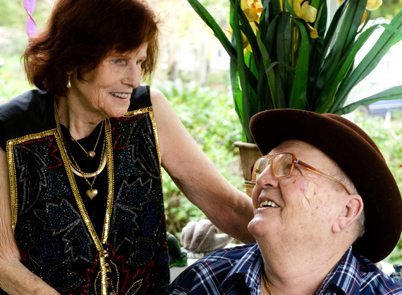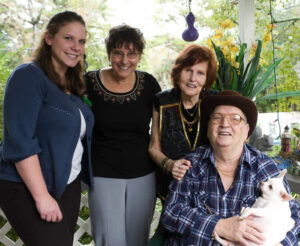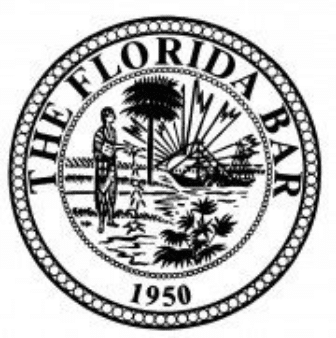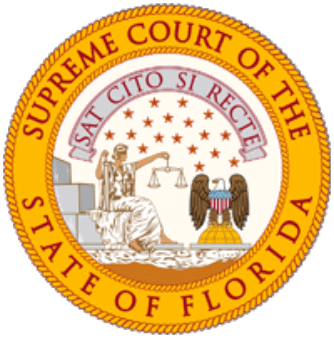
For five years, Jodi Guin sat on a busy Tallahassee, Fla., street corner selling peanuts to earn enough money to buy the shady lot where she would later put the yellow doublewide that is now her home.
Sometimes it got so hot, she’d put her feet —shoes and all — into a bucket of ice.
“On the bank it showed it was 105 a lot of times, and we’d be sitting down there selling peanuts,” Guin remembers.
After she bought the trailer with a small inheritance, she lived there alone until one night, she went to a dance at the American Legion Hall, and she met Bobby.
“I walked in, and there she was, and I said, ‘Are you married?’ and she said, ‘No,’ ” Bobby Guin recalls. “I said, ‘You got a boyfriend?’ and she said, ‘No.’ I said, ‘I’ll be right back,’ and I went over and got me a drink.”
Jodi interrupts her husband’s yarn to interject: “And he’s been here ever since.”
Bobby, 75, is a retired plumber; Jodi, 80, a former restaurant manager. Their life together goes back more than 20 years, and although declining health has brought them hardship, theirs is still a warm, happy home filled with small tokens of their love for each other — artificial flowers, tiny figurines, and their Chihuahua, Bobbie Joe.
Living on Social Security, they were getting by in spite of Bobby’s diabetes and Jodi’s congestive heart failure. Then in early 2006 they went to the pharmacy to fill their prescriptions and were told their new Medicare Part D plan wouldn’t pay for them.
Meanwhile, Jodi’s monthly drug premiums were deducted from her Social Security check, even though she wasn’t supposed to pay a premium under Part D.
With more than $3,000 in monthly medication costs dwarfing their meager income, Jodi spent hours on the phone trying to get help. A newspaper reporter documenting their plight called Florida Legal Services (FLS) to ask if they could intervene.
FLS attorney Anne Swerlick helped the Guins wade through the intricacies of Medicaid, which still pays for certain classes of drugs for low-income Medicare recipients, and the more convoluted Medicare Part D. She also got the Guins into the Medicare Part D low-income subsidy program.
Today, the Guins pay about $6 every three months for their medications through a mail-order pharmacy.
“I tell you what happened,” Bobby said. “We got lost in the system when they come out with this [Medicare Part D]…”
“And they fished us out,” said Jodi, pointing to Swerlick and Bonnie Koon, who coordinates the Florida Medicare/Medicaid Prescription Drug Helpline at FLS.

The helpline is part of the Shirley Spuhler Health Care Fairness Project, named for its founding director, who lost her own battle with cancer just over a year ago. The project uses strategies including class action litigation, fair hearings, outreach and education, attorney and paralegal training, and policy advocacy.
Through the helpline, Koon assists low-income Florida residents whose prescription drug claims are denied by Medicaid or Medicare, or who have questions about the low-income subsidy.
The Guins are among 6.4 million U.S. seniors and disabled individuals known as “dual eligibles,” meaning they receive benefits through both Medicare and Medicaid. In 2006, when Part D was implemented, dual eligibles lost their Medicaid prescription drug coverage and had to choose a Part D plan.
As it turns out, the Guins weren’t the only ones lost in the system. Through FLS, Jodi became one of the named plaintiffs in a nationwide class action to force the Secretary of Health and Human Services to provide dual eligibles with effective, timely access to prescription medication under Medicare Part D. The 2006 case, Situ v. Leavitt, was brought by the Center for Medicare Advocacy and the National Senior Citizens Law Center.
The U.S. Federal District Court in the Northern District of California allowed the case to proceed, noting that the computer system of the Centers for Medicare & Medicaid Services (CMS) could take up to 76 days to relay low-income subsidy information to a pharmacist’s computer. A 2008 settlement agreement requires CMS to implement one-business-day processing and simplified documentation of eligibility for the low-income subsidy.
Meanwhile, Swerlick and FLS litigator Mariam Harmatz were working along with the Legal Aid Society of Palm Beach County and the National Health Law Program on a class action against Florida’s Agency for Healthcare Administration. The case came in the wake of new requirements set by the Florida Legislature that certain prescriptions be “prior authorized,” including those for patients on more than four brand name drugs, or those needing a drug not on the state’s Preferred Drug List (PDL).
The case, Hernandez et al v. Medows, challenged the state Medicaid agency’s failure to provide due process when denying prescription drug claims. Anthony Hernandez was a liver transplant recipient living on Social Security Disability income who had to be hospitalized after Medicaid stopped paying for Sporanox, which was helping prevent rejection of his new liver.
Discovery in Hernandez revealed that more than 50,000 prescriptions a month were being denied to Florida Medicaid patients and that while some received an alternative medication, 15,000 a month did not receive any drug that could treat their condition.
“Some of these are folks who may be on anti-psychotics — heavy-duty medications that help keep them out of institutions and nursing homes,” Swerlick said. ” And they are really living in fear of spiraling downward were they without these medications.
“Especially with mental health problems, it sometimes takes years for the doctors; they have to try different things. It’s very idiosyncratic whether something’s going to work, what combination of medications, so if you start messing around with that, you’re really going to be causing the recipient to be at risk.”
Under a 2003 settlement agreement, the state Medicaid agency must ensure that recipients receive written notice at the time of drug coverage denials. For refills, the agency must ensure an immediate temporary supply and ongoing coverage pending the outcome of a fair hearing. Prior to Hernandez, these points of Medicaid law were untested.
A subsequent class action brought by FLS and other legal aid and advocacy organizations, Edmonds et al v. Levine, successfully challenged the state’s denial of Medicaid prescription drug claims for the off-label use of Neurontin, a drug widely prescribed for pain and mood disorders.
FLS is now using the helpline to keep tabs on government compliance with the settlement agreements and to detect emerging trends. To address systemic issues,
FLS often works first through legislative and administrative channels rather than the courts
Recently, Swerlick wrote the Florida Medicaid Pharmaceutical and Therapeutics Committee, which makes recommendations to the Agency for Healthcare Administration on prior authorization requirements, to urge that they provide continuity of care for patients on anti-depressants, anti-convulsants and anti-psychotics.
She requested that the committee recommend allowing these patients to continue coverage when such drugs are removed from the PDL, provide 60 days’ written notice to patients and prescribers affected by elimination of a medication from the list, or provide a transitional benefit to allow the physician time to pursue prior authorization.
Drug substitutions and denials can be life-threatening to the patient as well as costly to the state when the result is a hospitalization or emergency room visit.
Swerlick cited the case of a 19-year old developmentally disabled man whose mother called the helpline after his seizure medication was taken off the PDL. She resorted to taking him the emergency room to get the drug, as the last time his doctor had tried to switch his medication, he’d had a dozen seizures in one day.
“In addition to anti-convulsants, of particular concern are PDL changes relating to psychotropic medications,” Swerlick wrote the committee. “When these changes have been made in the past, we have received heartbreaking calls, typically from distraught family members whose loved ones have ended up in a hospital because they could not get their medications.”
It remains to be seen what action, if any, the committee will take based on Swerlick’s advocacy. Although her arguments on behalf of Florida’s medically needy are backed by hard evidence, both legal and medical, Swerlick often struggles to be heard by legislators, agency heads and other decision-makers.
Still, the value to the millions of Florida Medicare and Medicaid beneficiaries of an advocate like her is clear. Just ask Bobby Guin, who can now afford his insulin and other medications.
“We wouldn’t have never got that if it hadn’t been for Anne and her crew, because they’re the ones who went to bat for us for our medicine,” Guin said. “They’ve really come through for us.”
How The Florida Bar Foundation Helps
The Shirley Spuhler Health Care Fairness Project is just one of many programs at Florida Legal Services supported by The Florida Bar Foundation, whose support for FLS in 2009-10 includes:
General Support
$3.04 million
Migrant Farmworker Justice Project
$861,052
Affordable Housing Advocacy $377,160
Staff Attorney Salary Supplement
$210,088
Children’s Legal Services
$159,650
Pilot Pro Bono Project
$146,255
Statewide Pro Bono Project
$108,000
For more information visit:
www.floridalegal.org
FLORIDA MEDICARE/MEDICAID PRESCRIPTION DRUG HELPLINE
1-800-436-6001
In 2009, the helpline provided counsel and assistance to 407 callers with Medicaid and/or Medicare prescription drug problems. These callers included Medicaid and Medicare beneficiaries as well as social workers, advocates, physicians and medical office staff. The helpline offered advice on the legal right to appeal a prescription denial, as well as assistance to medical office staff in requesting prior authorizations, coverage determinations, and exceptions to step therapy, in which recipients prescribed a drug not on the Preferred Drug List have to try an alternative drug until it is proven ineffective. Most callers were able to get coverage for their denied medications.




